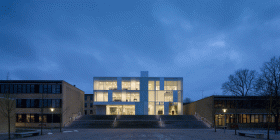CITIES’s partner in Center Danmark, EWII, published a press release yesterday, where their CEO, Lars Bonderup Bjørn, and project manager of CITIES, Henrik Madsen, commented on an analysis from Dansk Energi.
—
Today, an analysis was published by Dansk Energi, which concludes that the existing electricity network in Denmark does not have the capacity for the green transition that society is facing. It is, therefore, necessary to have an action plan from the politicians, which ensures that our electricity network is not overloaded – for example by the many electric cars we expect that will come on the road in the future.
At EWII, we support Danish Energy. Therefore, we have long been in the process of facilitating and initiating research in the area:
“We welcome this discussion. At EWII, we have chosen to invest money and employees in finding green solutions, because we completely agree with Dansk Energi that the electricity grid’s capacity is a problem we have to deal with,” Lars Bonderup Bjørn, CEO of EWII, says.
“We have, among other things, a green research centre, Center Danmark, which facilitates research into solutions in that area, and we have a number of projects that focus on precisely the challenge of the electricity grid capacity,” he says.
These include Flexible Energy Denmark (FED), which is a research project supported by the Innovation Fund Denmark. The project aims to develop green solutions using data and artificial intelligence, and in this way seek to utilize the green energy in the best possible way, so that no peak loads occur on the electricity grid in the “rush hour”, where everyone wants to cook, wash clothes and charge their electric car at the same time.
“It is absolutely necessary to prioritize research that supports the green transition while ensuring that our infrastructure is able to cope with the changes,” Lars Bonderup Bjørn says. He is also chair of the steering committee in Flexible Energy Denmark.
Professor at DTU Compute, Henrik Madsen, Head of Center for IT-Intelligent Energy Systems in Cities (CITIES), is one of the researchers participating in Flexible Energy Denmark:
“With the FED project, we get the opportunity to research a better use of green energy. So far, the electrical systems have mainly been designed so that production follows consumption. But in the future, where solar and wind energy will be dominant, there will be a need for electrical systems that are designed in such a way that consumption in the future must follow the production,” he says.
“The FED project will contribute to a reduction in the climate impact, better finances, and greater security of supply in the electricity grid. The project will lead to a more efficient energy system, where investments in electricity networks, wind turbines, solar energy production, etc. will be better utilized. The key to it is to utilize the great flexibility potential of the multi-supply systems through new digitization solutions – for example by storing the energy surplus from the wind turbines in district heating systems,” Henrik Madsen says.
For further information, please contact:
Lars Bonderup Bjørn, Chairman of Flexible Energy Denmark and CEO of EWII on tel. +45 23 73 71 18
Henrik Madsen, Professor at DTU Compute and Center Head of the Center for IT-Intelligent Energy Systems in Cities on tel. +45 20 83 43 04.
About Flexible Energy Denmark
The project is a four-year research project and has received the Innovation Fund Denmark’s largest grant this year of DKK 30 million. The total budget is DKK 40 million. There are 24 partners in the project, and they include universities, companies and stakeholders in the supply industry. EWII, together with DTU, is in charge of the project, which started on April 1, 2019.




